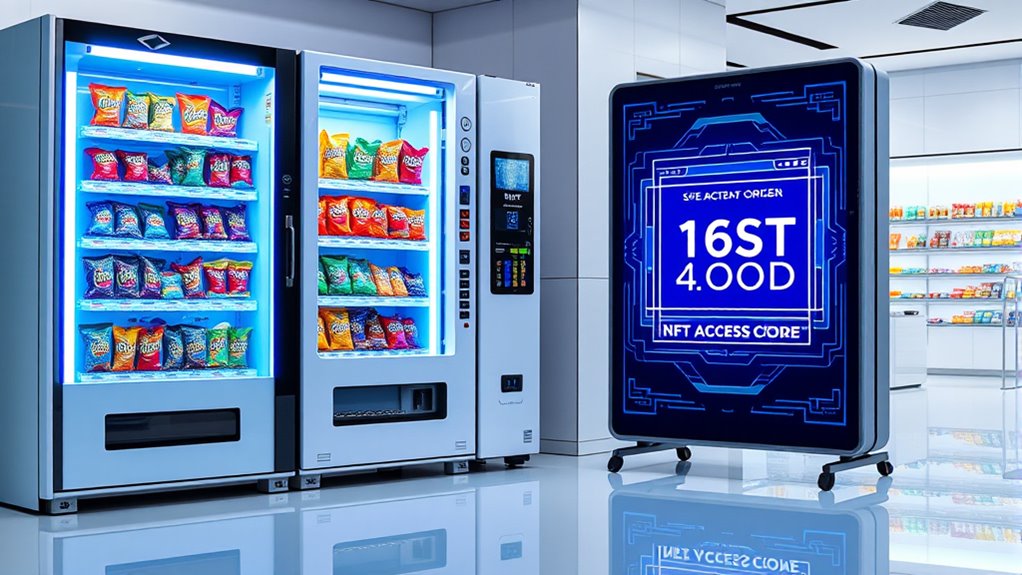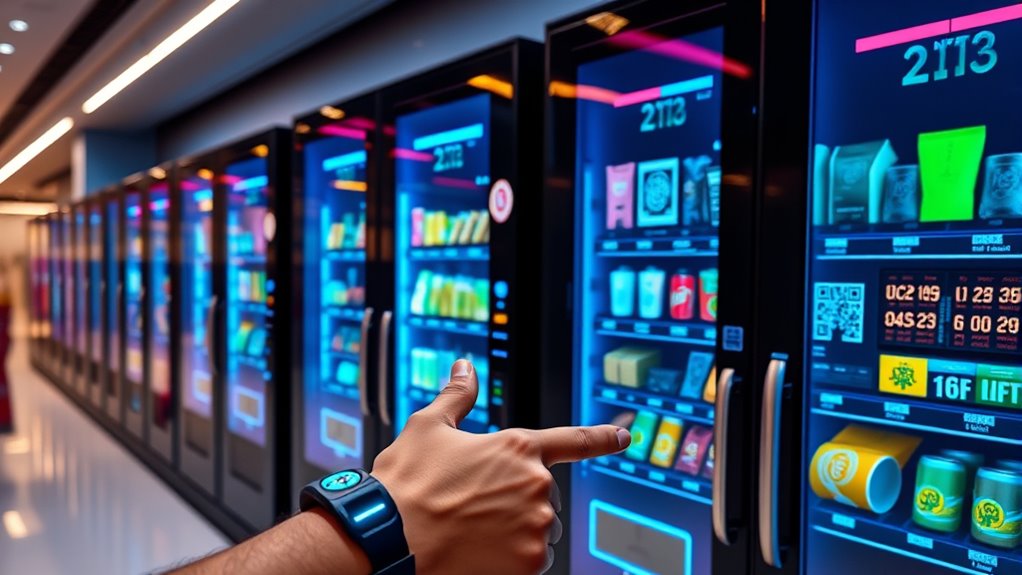Vending machines using NFT access codes are a promising innovation, offering a secure, digital way to open items without physical tokens. You would store a unique blockchain-based key in a digital wallet, granting access securely and tamper-proof. While the technology is still emerging, it could improve security and provide new ways to manage access. However, challenges remain around user familiarity and infrastructure costs—continue exploring to see if this future idea truly takes hold.
Key Takeaways
- Blockchain-based NFT access codes can enhance security and prevent forgery in vending machine transactions.
- Widespread adoption faces challenges due to user unfamiliarity with digital wallets and blockchain technology.
- Upgrading existing vending machines for NFT compatibility involves significant costs and technical complexity.
- Network reliability and potential congestion could temporarily hinder access, impacting user experience.
- Overall feasibility depends on simplifying user interfaces and addressing infrastructure costs, making it more than just hype.

Imagine walking up to a vending machine that doesn’t just dispense snacks but grants you access through a unique digital key. Instead of inserting cash or swiping a card, you use an NFT—non-fungible token—that acts as a digital access code. This concept might sound futuristic, but it’s gaining traction as a potential way to redefine how we interact with vending machines. By leveraging blockchain security, your digital ownership of the NFT is both protected and verifiable, giving you confidence that your access isn’t easily duplicated or stolen. The blockchain acts as a secure ledger, ensuring every transaction and ownership change is transparent and tamper-proof. When you hold an NFT that grants access, you fundamentally own a digital key stored securely on the blockchain, which can be used to unlock the machine. This eliminates the need for physical keys, cards, or cash, creating a seamless, contactless experience.
NFTs as digital keys offer secure, contactless access to vending machines, transforming ownership and interaction through blockchain technology.
However, you should consider whether this technology is truly feasible or just hype. On one hand, blockchain security offers an unmatched level of trust because it’s decentralized and resistant to hacking. Your digital ownership of the NFT is recorded immutably, meaning no one can forge or manipulate your access rights. This could considerably reduce theft, fraud, or unauthorized access. Plus, the integration with digital wallets makes it easy to manage multiple access codes, transfer them if needed, or even resell them, adding a layer of flexibility not available with physical tokens.
On the other hand, implementing NFT-based access in vending machines faces practical hurdles. Not everyone is familiar with digital wallets or blockchain technology. The user experience needs to be straightforward; otherwise, it risks alienating potential users. There’s also the question of how to handle situations where the blockchain network is congested or offline, which could temporarily block access. Additionally, the cost and complexity of upgrading traditional vending machines to accept NFT-based access could be prohibitive for many operators.
Despite these challenges, some companies are experimenting with blockchain-secured access systems, seeing the potential for enhanced security, digital ownership, and new revenue streams. While it’s still early days, the idea of vending machines operated via NFT access codes isn’t entirely out of reach. Whether it becomes mainstream or remains a niche innovation depends on how well the technology can address usability, cost, and scalability concerns. For now, it’s an intriguing glimpse into a future where our digital identities and physical experiences intertwine more tightly than ever.
Frequently Asked Questions
How Secure Are NFT Access Codes for Vending Machines?
You might wonder how secure NFT access codes are for vending machines. They rely on digital encryption to protect your access, making unauthorized entry difficult. However, like any digital system, vulnerabilities can exist if security isn’t properly implemented. Access control is vital; strong encryption and regular updates help prevent hacking. While generally secure, you should stay cautious and make sure the system uses robust digital encryption to keep your transactions safe.
What Types of Products Can Be Sold via Nft-Enabled Vending Machines?
You can sell a wide range of products through NFT-enabled vending machines, including digital collectibles like limited-edition art or music, which appeal to collectors. You might also offer exclusive experiences, such as VIP access or online events, linked to the NFTs. This approach creates unique value for customers, blending physical products with digital assets, making transactions more engaging and personalized.
How Do Users Redeem NFT Access Codes in Practice?
When you want to redeem an NFT access code, you typically use your digital wallet. First, scan the QR code provided by the vending machine, which links to your NFT. Then, follow the prompts to confirm the redemption within your wallet app. This process makes it easy to access your purchase quickly, ensuring a smooth transaction every time you redeem an NFT access code.
Are There Legal or Regulatory Challenges With NFT Vending Systems?
Have you considered whether legal hurdles could block NFT vending systems? You might worry about intellectual property rights and consumer protection laws, which vary by jurisdiction. These regulations could complicate access, ownership, and resale of digital assets. Are companies prepared to navigate these legal complexities? Staying compliant is vital to avoid lawsuits or penalties, making understanding these challenges essential before deploying NFT-enabled vending machines.
What Is the Cost Comparison Between Traditional and NFT Vending Machines?
You should consider the cost analysis when comparing traditional and NFT vending machines. NFT machines often have higher initial expenses, including digital infrastructure and blockchain integration, but may reduce ongoing costs like card replacements or cash handling. The expense comparison shows that while NFT vending machines might be pricier upfront, they could lower maintenance costs over time. Evaluate your budget and operational needs to determine which option offers better value.
Conclusion
Think of these vending machines with NFT access codes as seeds planted in a digital garden. While they might promise a lush harvest of novelty and exclusivity, only time will reveal if they truly flourish or wither away. Just as a gardener tends carefully, you must watch for real value beyond the hype. In this evolving landscape, whether it’s a fleeting bloom or lasting fruit depends on your discernment and the roots of genuine utility.









